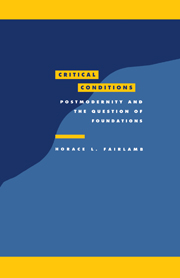Book contents
- Frontmatter
- Contents
- Preface
- Acknowledgments
- List of abbreviations
- Introduction
- 1 Fish's strong conventions: the mind's own world
- 2 Brave new words: postmodernism on epistemology
- 3 Theory and/or deconstruction: Derrida's slippage
- 4 Gadamer's universalism: the limits of hermeneutic authority
- 5 Critical politics: deconstruction for Americans
- 6 Foucault's microphysical politics: Big Brother is missing
- 7 Habermas' neo-formalism: theory as praxis
- 8 Critical theory and postmodern localism: rebels without a cause
- Conclusion
- Bibliography
- Index
6 - Foucault's microphysical politics: Big Brother is missing
Published online by Cambridge University Press: 01 June 2011
- Frontmatter
- Contents
- Preface
- Acknowledgments
- List of abbreviations
- Introduction
- 1 Fish's strong conventions: the mind's own world
- 2 Brave new words: postmodernism on epistemology
- 3 Theory and/or deconstruction: Derrida's slippage
- 4 Gadamer's universalism: the limits of hermeneutic authority
- 5 Critical politics: deconstruction for Americans
- 6 Foucault's microphysical politics: Big Brother is missing
- 7 Habermas' neo-formalism: theory as praxis
- 8 Critical theory and postmodern localism: rebels without a cause
- Conclusion
- Bibliography
- Index
Summary
I mistrust all systematizers and I avoid them. The will to a system is a lack of integrity.
NietzscheThe politics of theory
The problem of Foucault's politics begins with a paradox. On the one hand, Foucault refers to his “hyper- and pessimistic activism” (FR, 343), and professes his interest in “the problem of the regime, the politics of the scientific statement” (FR, 54), and in the “new ‘economy’ of power” (FR, 61). On the other hand, he shuns “a pre-established political outlook” or “the realization of some definite political project” (FR, 375). This apparent ambivalence toward politics grows out of a deeper theoretical ambiguity that traverses much of Foucault's work, identified by Kellner and Best as a litany of unresolved inner tensions:
[Foucault's] work oscillates between totalizing and detotalizing impulses, discursive and bio-politics, destroying the subject and resurrecting it, assailing forms of domination but eschewing normative language and metadiscourse. He sometimes attacks the Enlightenment and modern theory in toto while at other times aligning himself with their progressive heritage. His later positions seek a cultivation of the subject in an individualistic mode that stands in tension with the emphasis on political struggle by oppressed groups.
The apparent ambiguity of Foucault's combination of skeptical and emancipatory interests fosters two views of his politics depending on what philosophical and political commitments one brings to his texts.
The two Foucaults
On one reading, Foucault's histories are taken as local narratives, limited to “always partial and local inquiry” (FR, 47), and to epistémè-relative perspectives on “a complex system of distinct and multiple elements, unable to be mastered by the powers of synthesis” (FR, 94), while his meta-critical remarks are understood as contextually situated claims about past and present practices.
- Type
- Chapter
- Information
- Critical ConditionsPostmodernity and the Question of Foundations, pp. 171 - 203Publisher: Cambridge University PressPrint publication year: 1994



